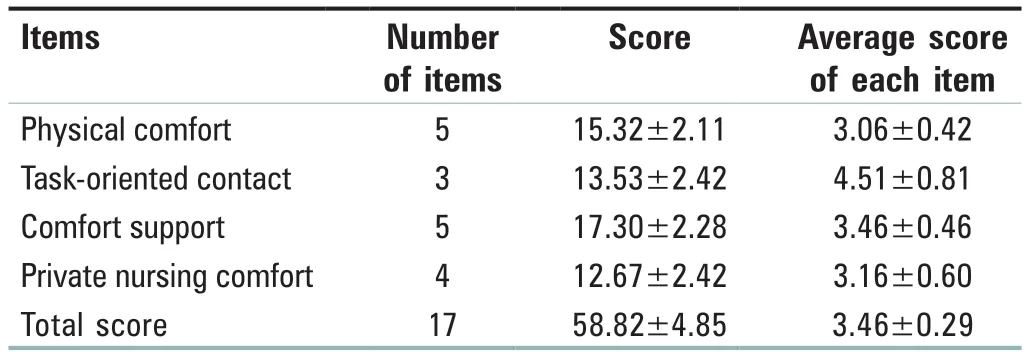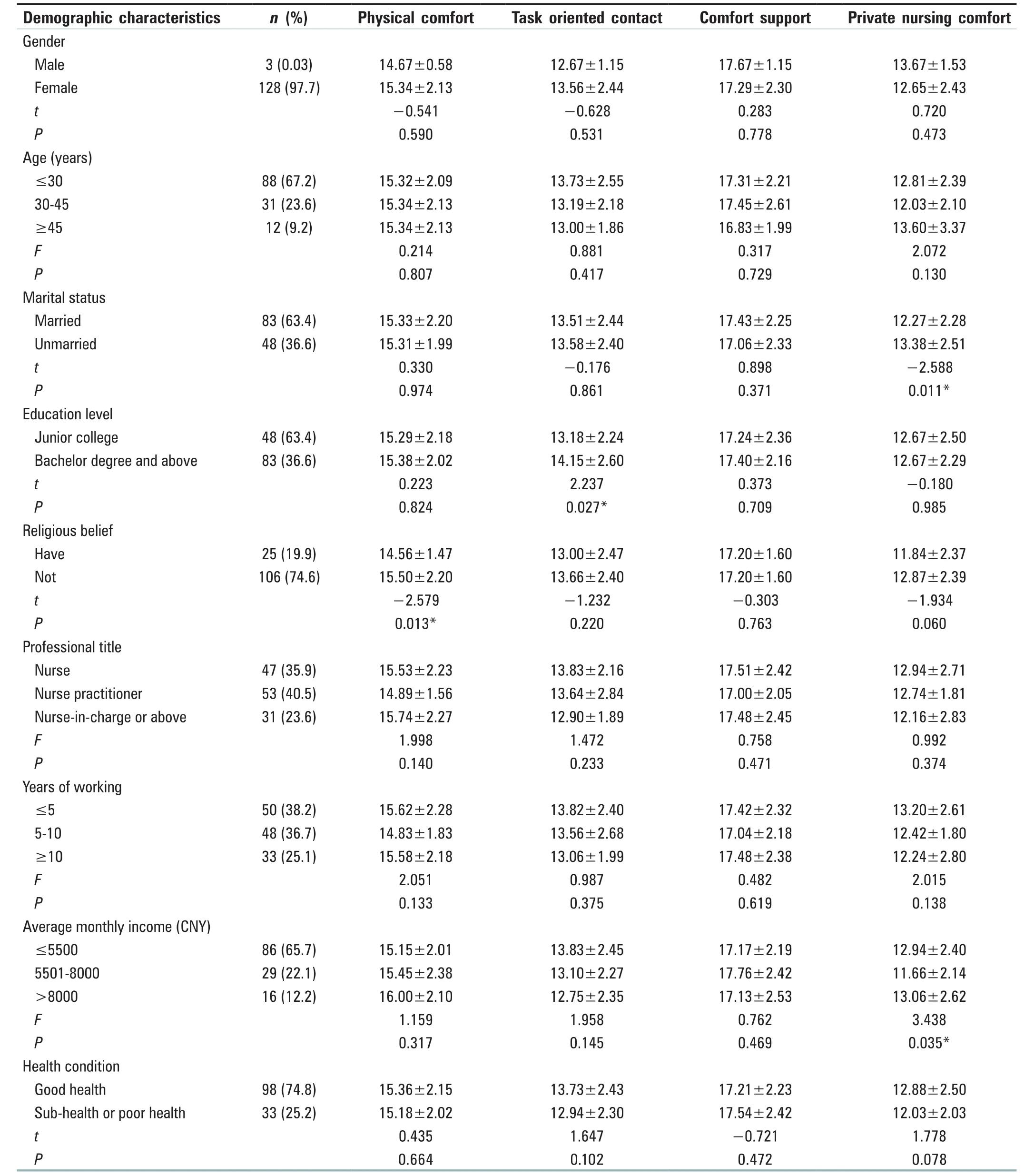Status quo and influencing factors of comfort with touch among nursing staff in rehabilitation department:A cross-sectional study
2021-10-12YunJieTONGDanDanLUMeiFenLYUYanMeiLIUShiYunTAN
Yun Jie TONG ,Dan-Dan LU ,Mei-Fen LYU ,Yan-Mei LIU ,Shi-Yun TAN
1School of Nursing,Shaanxi University of Chinese Medicine,Xianyang,Shaanxi,China;2Department of Rehabilitation,Qujing First People’s Hospital,Qujing,Yunnan,China;3Department of Acupuncture,Shaanxi Hospital of Traditional Chinese Medicine,Xi’an,Shaanxi,China
ABSTRACT Objective:The objective of this study is to investigate the current status of comfort with touch among nursing staff in the rehabilitation department and analyze its influencing factors.Materials and Methods:The convenience sampling method was used to select 131 nursing staff in the rehabilitation department of 3A-level hospitals in Yunnan Province,China,from March to June 2020 to conduct a questionnaire survey.Results:The nurses’ comfort with touch score of 131 clinical nurses in the rehabilitation department was 58.82 ± 4.85.Multivariate regression analysis showed that compassion fatigue (t=-2.968, P < 0.01) and occupational social support (t=2.767, P < 0.01) were the influencing factors of the physical comfort of nursing staff;average monthly income (t=-2.160, P < 0.05),occupational cognitive evaluation (t=4.924, P < 0.01),and secondary traumatic stress (t=2.833, P < 0.01) were the influencing factors of task-oriented contact among nursing staff;marital status (t=2.656, P < 0.01) and occupational social support (t =2.078, P < 0.05) were the influencing factors for private nursing comfort of nurses.Conclusion:The comfort with touch among nurses in the rehabilitation department is at a medium level.Nursing managers should pay attention to their comfort with touch.In order to promote the development of medical service,hospitals should constantly improve the security and social support of nursing practitioners from the aspects of system,management,and salary performance.
Keywords:Comfort with touch,compassion fatigue,nursing staff,occupational identity,rehabilitation
INTRODUCTION
Touch therapy was first proposed in the 1970s.[1]Touch is an inevitable part of nursing work.Nurses carry out the nursing operation,health education,body touch,and psychological counseling to patients through the various forms of contact.Several studies have shown that touch can relieve patients’ pain,reduce their negative emotions,and improve patient satisfaction.[2-5]Comfort with touch refers to an emotional experience in which the touch executor performs touch without anxiety or concern.[6]Pedrazzaetal.[7]showed that the comfort of nurses during touching may affect the frequency and effect of their touching.The diseases in the rehabilitation department such as stroke,senile chronic diseases,craniocerebral injuries,and other diseases,are complex and varied,with high disability rates,accompanied by cognitive dysfunction and difficult to communicate normally,which makes clinical work complicated and lead to nurses’ compassion fatigue,consequently affecting their comfort with touch.[8]Hence,in this study,we investigated the comfort with touch among Chinese nurses in the rehabilitation department from March to June in 2020 through questionnaire survey,and analyzed the influencing factors,with a view to providing a reference for improving the nurses’ comfort with touch in the rehabilitation department.
MATERIALS AND METHODS
Objects of study
From March to June 2020,the convenience sampling method was adopted to select 131 nurses in the rehabilitation department of 3A-level hospitals in Yunnan Province,China as the survey subjects.The inclusion criteria were as follows:(1) nurses who obtained a nurse practitioner certificate;(2) nurses who voluntarily participated in this survey;and (3) nurses who worked in rehabilitation for more than 1 year.The exclusion criteria were as follows:(1) trainees and interns in the rehabilitation department;(2) sickness or illness during the recovery period;and (3) nurses who were not on duty during the investigation period,such as vacations,going out for further training.
Research instruments General information questionnaire
It includes gender,age,marital status,education level,religious belief,professional title,years of working,average monthly income,and health condition.
Nurses’ Comfort with Touch Scale
The Nurses’ Comfort with Touch Scale (NCTS) is mainly used to evaluate the inner comfort of nurses when they touch patients at work.In 2017,Baietal.[9]carried out translation and cultural debugging of NCTS to formed the Chinese version of NCTS and verified its good reliability and validity.The Chinese version of the scale includes four dimensions:physical comfort with five items,task-oriented contact with three items,comfort support with five items,and personal care with four items.Each item is scored on a 7-point Likert scale,and the average score of items ≤2 points indicates extremely poor comfort with touch,2-2.9 points indicates poor comfort with touch,3-4.9 points indicates moderate comfort with touch,and ≥5 points indicates good comfort with touch.The coefficient of Cronbach’s alpha for the Chinese version of NCTS was 0.966.[9]
Professional quality of life scale
The Professional Quality of Life Scale (ProQOL) was translated and revised by Chen and Wang.[10]It is the most common tool used for assessing nurses’ compassion fatigue.The scale consists of three dimensions:Compassion satisfaction (CS),burnout (BO),and secondary traumatic stress (STS).Each dimension contains 10 items,and each item is scored by the Likert 5 scale method.Each dimension is scored separately,and its critical value is:≤22 is low level,23-41 is medium level,and ≥42 is high level.The coefficients of Cronbach’s alpha for the total scale and its three dimensions are 0.91,0.87,0.73,and 0.84,respectively,which indicates that the scale has high reliability.
Nurse Occupational Approval Scale
This scale is used to evaluate the level of professional identity of nurses in China,including 30 items in five dimensions,namely vocational cognitive evaluation with nine items,occupational social support with six items,professional social skills with six items,coping with career setbacks with six items,and professional self-reflection with three items.Each item is scored using the Likert 5 scale method.The higher the score,the stronger the sense of professional identity is.The co-efficient of Cronbach’s alpha of the scale is 0.938,and the split-half reliability is 0.88,indicating that the scale has high reliability and validity.[11]
Ethical considerations
Ethical approval for this study was not required,but the researchers tried not to harm the participants.In addition,we obtained the support of the hospital department managers and obtained the verbal consent of the respondents before the data collection.The participants were not exploited financially or physically.
Data collection
A total of 140 questionnaires were issued and 136 copies were returned,with a recovery rate of 97.14% (136/140).After excluding invalid questionnaires,a total of 131 copies were obtained,with an effective rate of 93.57% (131/140).
Statistical analysis
The data were analyzed using the SPSS 21.0 statistical software (SPSS,Chicago,IL,USA).The count data and measurement data were analyzed by the descriptive analysis,and the bivariate correlation was analyzed by the Pearson correlation analysis;the influencing factors of various dimensions of clinical nurses’ comfort with touch were analyzed by multiple linear regression.The difference was statistically significant whenP< 0.05.
RESULTS
Status of nurses’ comfort with touch in rehabilitation department
The total score of NCTS for 131 nurses in the rehabilitation department was 58.82 ± 4.85,of which the task-oriented contact dimension had the highest average score,as shown in Table 1.

Table 1:Scores of nurses’ comfort with touch in rehabilitation department (n=131)
Single factor analysis of nurses’ comfort with touch in rehabilitation department
From Table 2,there was no statistical significance difference in different gender,age,professional title,years of working,and health condition of the nurses in the rehabilitation department regarding the scores of dimensions of comfort with touch (allP> 0.05),but the scores of comfort with touch were statistically significant in different marital status,educational level,religious belief,and average monthly income (allP< 0.05).
Correlation of nurses’ comfort with touch,compassion fatigue,and professional identity
Task-oriented contact dimension of NCTS was positively correlated with CS dimension (r=0.200,P=0.022),BO dimension (r=0.282,P=0.001),and STS dimension (r=0.181,P=0.038) of the ProQOL scale,and vocational cognitive evaluation dimension (r=0.348,P< 0.01),occupational social support dimension (r=0.308,P< 0.01),professional social skills dimension (r=0.251,P=0.004),and coping with career setbacks (r=0.282,P=0.001) of Nurse Occupational Approval Scale except for occupational self-reflection dimension (r=0.165,P=0.059).Physical comfort dimension was negatively correlated with STS dimension of ProQOL (r=-0.178,P=0.042) and compassion fatigue (r=-0.179,P=0.041).Private nursing comfort dimension was positively correlated with occupational social support dimension (r=0.172,P=0.049).
Influencing factors of dimensions of nurses’ comfort with touch in rehabilitation department
Multiple linear stepwise regression analysis was performed with the dimensions of nurses’ comfort with touch as dependent variables,and the variables with statistically significant differences by single factor analysis,compassion fatigue and its dimensions,and professional identity and its dimensions as independent variables.The results showed that compassion fatigue and occupational social support were the influencing factors of the physical comfort of nursing staff in the rehabilitation department.Monthly income,nurses’ vocational cognitive evaluation,and STS were the influencing factors of task-oriented contact among nursing staff in the rehabilitation department.Marital status and occupational social support were the influencing factors of nurses’ private nursing comfort in the rehabilitation department (allP< 0.05) [Table 3].

Table 2:Analysis of the scores of dimensions of nurses’ comfort with touch scale in rehabilitation department with different demographic characteristics (n=131)

Table 3:Multivariate linear stepwise regression analysis of factors affecting nurse’s comfort with touch
DISCUSSION
The results of this survey showed that the total score of the comfort with touch among the nursing staff in the rehabilitation department ranged from 46 to 72 years,with an average of total score 58.82 ± 4.85 and the mean score of each item of 3.46 ± 0.29,indicating comfort with touch among nurses was at a medium level.This is similar to the research results of Duetal.[12]Among all dimensions of NCTS,task-oriented contact has the highest score,indicating the nurses had higher comfort level when they touch patients during nursing operations such as infusion and blood transfusion.Nursing operations are an essential part of clinical work.Nurses should not only learn nursing operations during school,but also practice after entering the hospital,which is also one of the key points of standardized training in the hospital.[13]Therefore,nurses can skilfully and accurately carry out various nursing operations,so they have a high comfort level in this dimension.
The score of the physical comfort dimension (3.06 ± 0.42) was lower than that of Ganetal.[6]The reason for this may be that the participants in Ganetal.’s study were general nurses,whereas the participants of the present study were nurses in the rehabilitation department who were mostly facing patients with cerebrovascular diseases,spinal cord injuries,etc.,Different from other diseases,those patients who are often accompanied by cognitive,motor,and bowel function disorders of varying degrees,and poor self-care ability,need more assistance in daily life.They need nursing staff in the rehabilitation department to make evaluation on their skin,body activities,and mental state at any time,and provide massage and care for them every day.That means nurses are faced with heavy nursing work for a long time,which reduces nurses’ comfort with touch.Therefore,nursing managers should pay attention to the psychological situation of nursing staff,reasonable arrangement of working time,improve the physical comfort of nurses.
In this study,we found that the compassion fatigue and the overall professional identity of nurses in the rehabilitation department were at a medium level,and the higher the score of compassion fatigue of nurses in the rehabilitation department,the lower the nurses’ comfort with touch,which was consistent with the research results of Ganetal.[6]
The influencing factors of the physical comfort of nursing staff in the rehabilitation department were compassion fatigue and occupational social support.Nurses with low compassion fatigue (especially STS) and high professional social support scored higher in physical comfort.When nurses face patients who require long-term repeated rehabilitation exercise,theywill inevitably feel tired and helpless.While occupational social support mainly refers to respect,support,and understanding from colleagues,family,and friends.The higher the emotional experience and satisfaction of individual social support,the higher the job satisfaction and the better the physical comfort.[14]
In addition,the results of the univariate analysis showed that there was a statistically significant difference in comfort with touch between nurses with and without religious belief (P< 0.05),and the score of physical comfort of nurses without religious belief were higher than those of nurses with religious belief,as different religious beliefs have different religious cultures that religious taboos may be violated in the care of patients,resulting in discomfort.It is suggested that the nursing manager of the rehabilitation department should understand the religious belief of the nursing staff,and respect the religious culture when arranging work,to improve their comfort level.
The influencing factors of task-oriented contact of nurses in the rehabilitation department were average monthly income,nurses’ vocational cognitive evaluation,and STS.Nurses with an average monthly income ≤5500 CNY scored higher in task-oriented contact than those with an average monthly income ≥8000 CNY.The reason may be that those with an average monthly income ≤5500 CNY work for a shorter time and are willing to spend more time to improve their nursing operation level,so the individual task-oriented contact comfort is higher.In addition,nurses with lower score of vocational cognitive evaluation had lower score of the task-oriented contact,and this may be the reason that the nursing work itself is a heavy task,with high pressure,and faced with a variety of doctor-patient contradictions,which results in the nursing staff having a low vocational cognitive evaluation,thus making the score of task-oriented contact low.Those with low score of STS had low score in task-oriented contact dimension,that is,the nursing staff could not relieve the negative emotions caused by traumatic events,which results in less enthusiasm for work and lower comfort level in the nursing operation of patients.The score of comfort support dimension of nurses in the rehabilitation department was 17.30 ± 2.28,and the average score of each item in the dimension was 3.46 ± 0.46,which indicated the comfort was at a medium level,and was lower than the results of Huangetal.[15]who selected nurses in the department of infectious diseases as study participants.The reason may be that the nurses in the department of infectious diseases need to help patients to reduce their inferiority through comfort support and encourage them to better integrate into the social environment while the nurses in the rehabilitation department must pay more attention to the treatment and rehabilitation of patients’ physical functions.
The influencing factors of private nursing comfort of nurses in the rehabilitation department were marital status and occupational social support.Unmarried nurses and those with high occupational social support scored higher in personal nursing comfort than married ones and those with low occupational social support.The reason may be that unmarried nurses often do not have pressure brought by marriage and children and have enough energy to take care of patients.Besides,the more social support nurses receive,the better their overall happiness will be.[16]Therefore,on one hand,the manager of rehabilitation department in the hospital should set up the people-oriented idea,care about the staff,often communicate with them,timely understand and help them solve the difficulties in work and life.On the other hand,family members should give work support and pay attention to their psychological condition and to improve their mental health.
CONCLUSION
As a simple and convenient noninvasive treatment method,touch therapy has been proven by many studies to effectively reduce patient anxiety and stress,relieve pain,and promote exercise recovery.[17-19]In clinical work,nurses not only play the role of comforting and encouraging patients but also achieve the purpose of curing diseases,so their comfort with touch will directly affect the effect of touch.Therefore,the managers of each department should pay attention to the training of basic knowledge and operating skills of nurses to improve their comfort with touch.
Financial support and sponsorship
Nil.
Conflicts of interest
There are no conflicts of interest.
杂志排行
Journal of Integrative Nursing的其它文章
- Effect of a traditional Chinese medicine theory-based mobile app on improving symptoms in patients with type 2 diabetes mellitus:A randomized controlled trial
- Comparison of in-vial exhaust method versus conventional exhaust method in the injection of COVlD-19 vaccine
- Analysis of licensure examination anxiety and its influencing factors among undergraduate nursing students
- Correlation between psychological resilience and burnout among female employees in a shopping mall in Xi Xian New Area,China:A cross-sectional survey
- Musculoskeletal problems and expressed practices of body mechanics among nursing officers at All lndia lnstitute of Medical Sciences Jodhpur,Rajasthan,lndia
- Evidence summaries for nutritional screening of head-and-neck cancer patients
